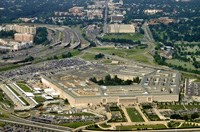






No military action is imminent at the moment, according to officials, but the Pentagon is grappling with an array of hellish scenarios that could emerge as the conflict escalates, with the Damascus regime possibly losing control of its chemical arsenal.
While US military planning in the past has focused on searching out weapons of mass destruction in the hands of a hostile government, the situation in Syria raises the possibility of stockpiles falling into the hands of militant groups or desperate members of a threatened regime.
"This is totally new territory historically. Never in history has a WMD-armed country fallen into civil war," said Charles Blair of the Federation of American Scientists.
"This has never happened," he told AFP.
The US experience in Iraq, in which an American-led force failed to secure some sensitive conventional weapons sites after the 2003 invasion, serves as a cautionary tale given the complexities in Syria, where reliable intelligence is even harder to come by, Blair said.
The International Atomic Energy Agency had identified and put under seal powerful high-yield explosives at an Iraqi regime base but many tons of the HMX explosives reportedly went missing, he said.
In addition, "their premier nuclear facility got looted" at Tuwaitha, he said.
"The only thing we can be sure (of) is there are going to be a lot of unpleasant surprises," said Blair.
President Barack Obama has suggested the use of chemical or biological weapons could trigger US military intervention.
However, for the moment, the administration says President Bashar al-Assad's regime retains control of the chemical arsenal and that there are no indications it is about to use the lethal weapons.
"We don't have perfect visibility to all the chemical weapons sites but we have very effective ways of monitoring chemical stockpiles," said a senior official, who spoke on condition of anonymity.
"Right now, the regime appears to have positive control of the sites," the official said.
US special operations forces (SOF) would likely play a central role in any plan to secure chemical weapons, though a larger conventional force could be required to provide enough manpower to safeguard the sites, the official added. "It's possible it would not be SOF, depending on what the situation is."
As the United States monitors the chemical arsenal with the help of spy satellites, officials have to take into account "whether the regime intends to use it, whether it falls into the wrong hands and whether there's a collapse of security around the sites," according to the official.
Syria's chemical weapons stockpile, which dates back to the 1970s, is the biggest in the Middle East, but its precise scope remains unclear, according to analysts.
Syria has hundreds of tons of various chemical agents, including sarin and VX nerve agents, as well as older blistering agents such as mustard gas, dispersed in about 50 manufacturing and storage sites, experts say.
However, it remains unclear if the chemical weapons are mounted and ready to be launched on Scud missiles, if the chemical agents are maintained effectively and whether the regime is able to replenish its chemical stocks, Blair said.
Damascus has said it might use its chemical weapons if attacked by outsiders, although not against its own people.
Given the dangerous combination of chemical weapons and civil upheaval, obtaining accurate intelligence could be the most difficult aspect of any mission to disable the arsenal.
"The degree to which we can use the network of defectors to determine what these stockpiles entail" could offer the best hope of safeguarding the arsenal, said Melissa Dalton, a former Pentagon official and a visiting fellow at the Centre for a New American Security.
The regime could choose to transfer the chemical stockpiles to its Hezbollah allies in Lebanon, though the Shiite militants would likely stop short of a move that could invite a massive Israeli assault, she said.
Hezbollah "knows how far it can go without incurring retaliation," she said.
Any military mission to secure the chemical sites likely would be a coalition effort, including NATO allies, Israel and Arab states, she said.
She added that Israel might be tempted to take action on its own, a move that Washington would try to head off.
"Because Syria is right in Israel's backyard, they (the Israelis) may want to go in unilaterally to prevent the stockpiles from falling into the hands of others," she said.
Source: AFP via I-Net Bridge

For more than two decades, I-Net Bridge has been one of South Africa’s preferred electronic providers of innovative solutions, data of the highest calibre, reliable platforms and excellent supporting systems. Our products include workstations, web applications and data feeds packaged with in-depth news and powerful analytical tools empowering clients to make meaningful decisions.
We pride ourselves on our wide variety of in-house skills, encompassing multiple platforms and applications. These skills enable us to not only function as a first class facility, but also design, implement and support all our client needs at a level that confirms I-Net Bridge a leader in its field.
Go to: http://www.inet.co.za